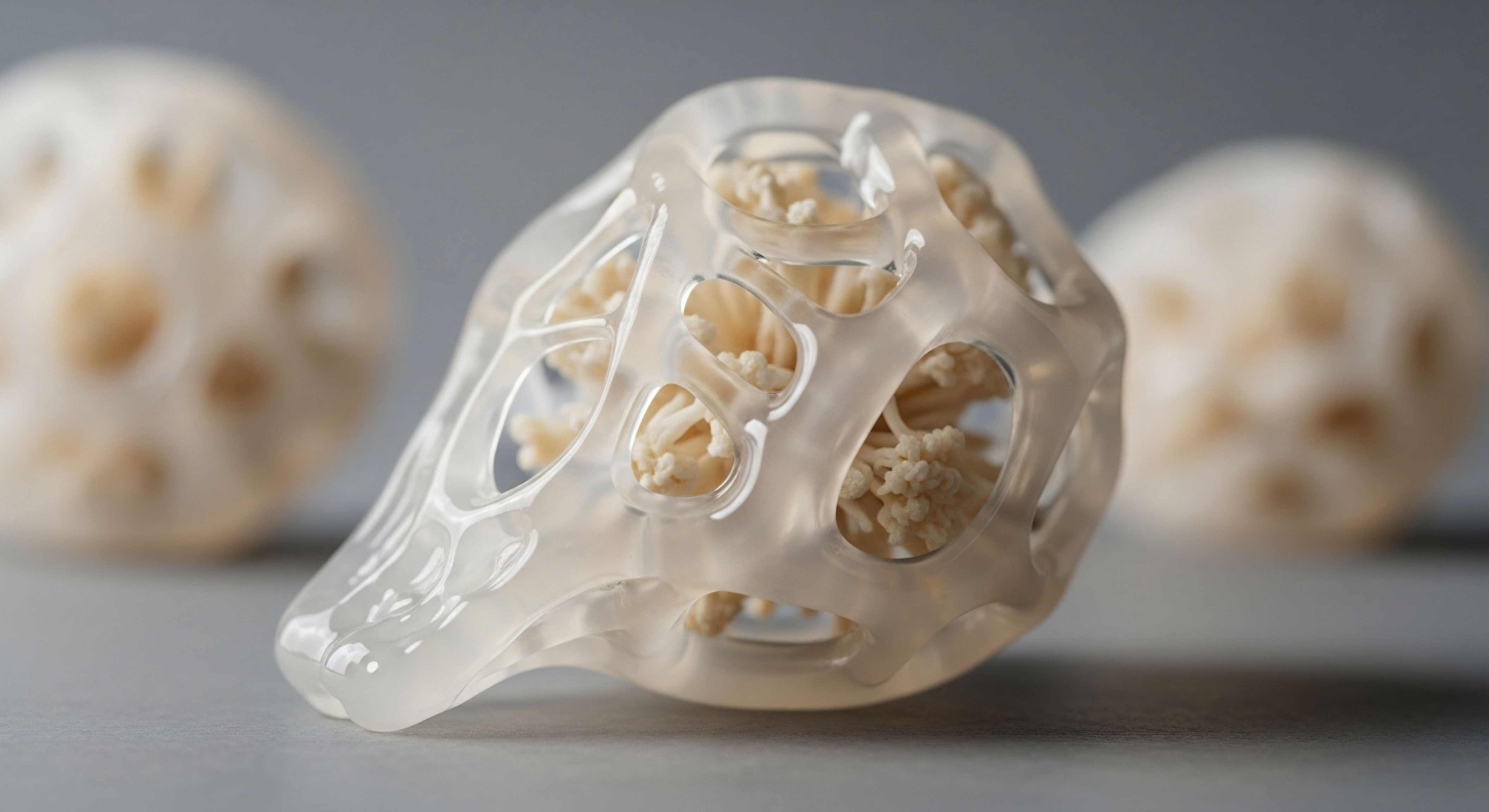

The Erosion of Peak Biological Function
The human body is a marvel of biological engineering, designed for peak performance and resilience. However, as time progresses, intrinsic biological processes initiate a gradual decline in key physiological systems. This decline is not a passive surrender but a series of cascading events that diminish energy, cognitive acuity, metabolic efficiency, and physical capacity. Understanding the root causes of this erosion is the first step toward proactive biological management and the reclamation of youthful vitality.

The Hormonal Cascade of Aging
Central to biological vitality is the intricate network of endocrine signaling. As individuals advance through life stages, the production and regulation of critical hormones naturally diminish. Testosterone levels in men, for instance, often decrease by 1-2% per year after age 30, impacting muscle mass, bone density, libido, mood, and cognitive function.
Similarly, women experience significant shifts with menopause, marked by a sharp decline in estrogen and progesterone, affecting bone health, cardiovascular function, sleep, and emotional equilibrium. Growth hormone (GH) and Insulin-like Growth Factor 1 (IGF-1) also decrease, contributing to reduced cellular repair, slower metabolism, and altered body composition. This systemic hormonal recalibration underpins much of the perceived aging process.

Disruptions in the Hypothalamic-Pituitary-Gonadal Axis
The Hypothalamic-Pituitary-Gonadal (HPG) axis is the primary regulator of sex hormones. Age-related changes can lead to reduced signaling from the hypothalamus and pituitary, resulting in lower gonadal stimulation. This dysregulation is a direct driver of diminished androgen and estrogen production, creating a feedback loop that perpetuates lower hormone levels and their associated downstream effects.
Average testosterone levels in men decline by approximately 10-20% per decade after the age of 40, correlating with increased risk of sarcopenia, metabolic syndrome, and diminished cognitive performance.

Metabolic Drift and Cellular Inefficiency
The body’s ability to efficiently convert fuel into energy, a process governed by metabolic pathways, also degrades with age. Mitochondrial function, the powerhouse of the cell, becomes less efficient, producing fewer energy units (ATP) and generating more damaging reactive oxygen species (ROS). This metabolic drift contributes to increased body fat, reduced insulin sensitivity, and systemic inflammation, collectively known as “inflammaging.”

Impaired Nutrient Sensing Pathways
Pathways like mTOR (mammalian target of rapamycin) and AMPK (AMP-activated protein kinase) play critical roles in cellular growth, metabolism, and stress response. Age-related dysregulation of these pathways can lead to anabolic resistance (difficulty building muscle) and impaired cellular repair mechanisms, further accelerating the aging phenotype.

The Accumulation of Cellular Damage
Over time, cells accumulate damage from various sources, including oxidative stress, glycation, and DNA errors. Cellular senescence, a state where cells stop dividing but remain metabolically active and secrete inflammatory factors, contributes significantly to tissue dysfunction and age-related diseases. The body’s natural clearance mechanisms for senescent cells and damaged proteins become less effective, leading to a build-up that impairs tissue function and regeneration.
- Oxidative Stress ∞ An imbalance between free radical production and the body’s antioxidant defenses.
- Glycation ∞ The non-enzymatic binding of sugars to proteins and lipids, forming advanced glycation end products (AGEs) that stiffen tissues and impair function.
- Telomere Shortening ∞ Protective caps on chromosomes that shorten with each cell division, eventually signaling cellular senescence.


Precision Engineering for Biological Renewal
Reversing the trajectory of biological aging requires a strategic, data-driven approach that targets the core mechanisms of decline. This is not about superficial fixes; it is about precise biological recalibration, employing advanced scientific protocols to restore optimal function across hormonal, metabolic, and cellular systems. The “Overnight Blueprint” is an aspirational framework for accelerated biological restoration, built on the foundation of cutting-edge endocrinology, peptide science, and metabolic optimization.

Hormone Optimization Protocols
Restoring hormonal balance is a cornerstone of biological rejuvenation. This involves carefully assessing an individual’s baseline hormone levels and implementing targeted replacement or modulation therapies.

Testosterone Replacement Therapy (TRT)
For men exhibiting hypogonadal symptoms or suboptimal testosterone levels, TRT can be transformative. Administered via injections, gels, or patches, TRT aims to restore testosterone to a youthful, physiological range. This directly combats muscle loss, enhances libido, improves mood and cognitive function, and supports bone density. The precise dosage and delivery method are critical, guided by regular biomarker monitoring.

Estrogen and Progesterone Modulation
For women, optimizing estrogen and progesterone levels, particularly post-menopause, is vital. Bioidentical hormone replacement therapy (BHRT) can alleviate menopausal symptoms, protect cardiovascular health, maintain bone density, and support cognitive function. The careful balance of these hormones, often alongside testosterone, is key to systemic vitality.

Growth Hormone and IGF-1 Support
While direct growth hormone injections are potent, they carry risks. The focus often shifts to supporting the body’s natural GH production or utilizing peptide secretagogues. Maintaining optimal GH and IGF-1 levels is crucial for tissue repair, metabolic rate, and body composition management.

The Power of Peptide Therapeutics
Peptides are short chains of amino acids that act as signaling molecules, instructing cells to perform specific functions. They offer a sophisticated means of targeting biological processes with remarkable precision.

Growth Hormone Secretagogues
Peptides like Sermorelin and Ipamorelin are designed to stimulate the pituitary gland to release more growth hormone. They do this by mimicking the body’s natural signaling peptides, GHRH (Growth Hormone Releasing Hormone) and ghrelin. This targeted stimulation can lead to improved sleep, enhanced cellular repair, increased lean muscle mass, and optimized fat metabolism.

Tissue Repair and Regeneration Peptides
Peptides such as BPC-157 (Body Protection Compound-157) and TB-500 (Thymosin Beta-4) are renowned for their potent healing and regenerative properties. BPC-157 has demonstrated significant efficacy in accelerating the healing of various tissues, including muscles, tendons, ligaments, and the gut lining. TB-500 promotes cell migration and tissue repair, aiding in recovery from injury and improving overall tissue resilience.
| Peptide Class | Primary Action | Potential Benefits | Target Systems |
|---|---|---|---|
| Growth Hormone Secretagogues (e.g. Sermorelin, Ipamorelin) | Stimulate endogenous GH release | Improved sleep, enhanced recovery, fat loss, muscle gain, skin health | Endocrine, Metabolic, Cellular Repair |
| Tissue Repair Peptides (e.g. BPC-157, TB-500) | Promote cellular repair and regeneration | Accelerated wound healing, reduced inflammation, improved joint function, gut health | Musculoskeletal, Gastrointestinal, Cellular |
| Metabolic Modulators (e.g. Metformin – drug, AICAR – research) | Influence glucose uptake and energy pathways | Improved insulin sensitivity, enhanced mitochondrial function, potential longevity effects | Metabolic, Cellular |
| Immune Support Peptides (e.g. Thymosin Alpha-1) | Modulate immune system function | Enhanced immune response, potential antiviral and anti-cancer effects | Immune System |
Clinical observations suggest that peptides like BPC-157 can accelerate tendon-to-bone healing by up to 50%, demonstrating a remarkable capacity for systemic tissue repair.

Metabolic and Cellular Re-Alignment
Beyond hormones and peptides, optimizing cellular energy production and waste clearance is paramount. This involves fine-tuning nutrient intake, supporting mitochondrial biogenesis, and enhancing autophagy (the cell’s internal recycling system). Strategies include targeted supplementation (e.g. NAD+ precursors, CoQ10), intermittent fasting protocols, and specific dietary patterns designed to optimize insulin sensitivity and reduce inflammation.


The Unfolding of Your Optimized Future
The concept of biological rejuvenation, while aspirational, is grounded in the reality of accelerated biological response. While true “overnight” transformation is a narrative device, the implementation of precise biological protocols can yield noticeable improvements in vitality and function within weeks, not years. The “When” of biological optimization is about strategic sequencing and consistent application, allowing the body’s inherent regenerative capacities to be fully unlocked and directed.

The Initial Response Phase
Upon initiating a comprehensive biological optimization program, the body begins to respond rapidly. Within the first 1-4 weeks, individuals often report significant shifts in energy levels, sleep quality, and mental clarity. Hormonal adjustments, particularly with TRT, can lead to a noticeable increase in drive and a reduction in fatigue. Peptide therapies, depending on their target, can begin to influence cellular signaling pathways, initiating repair and recovery processes.

Early Biomarker Shifts
Key physiological markers often begin to realign early in the process. Insulin sensitivity can improve, inflammatory markers may decrease, and baseline hormone levels will stabilize within therapeutic ranges. This initial phase is characterized by a sense of renewed vigor and a tangible uplift in daily performance.

Sustained Optimization and Adaptation
As the body adapts to the optimized hormonal and cellular environment, further benefits emerge over the subsequent 1-3 months. Lean muscle mass may increase, fat reduction becomes more pronounced, and physical recovery times shorten. Cognitive functions, including memory and focus, often reach new peaks. This phase solidifies the gains made in the initial period, establishing a new baseline of elevated function.
- Weeks 1-4 ∞ Foundational Reset – Noticeable improvements in energy, sleep, mood, and initial hormonal stabilization.
- Months 1-3 ∞ Systemic Adaptation – Enhanced body composition, improved cognitive function, accelerated recovery, and deeper cellular repair initiation.
- Months 3-6+ ∞ Peak Performance Integration – Sustained high-level function, robust immune support, and long-term preservation of biological youthfulness.

Long-Term Biological Stewardship
Biological rejuvenation is not a singular event but an ongoing commitment to proactive self-management. The principles of the “Overnight Blueprint” provide the framework for sustained vitality. Regular monitoring of biomarkers, adaptive adjustments to protocols based on individual response, and a continued focus on foundational lifestyle factors ∞ nutrition, sleep, stress management, and targeted exercise ∞ ensure that the gains are not only maintained but continue to evolve. The objective is to create a resilient, high-performing biological system that defies conventional aging.

The Apex of Your Biological Potential
The pursuit of biological rejuvenation is the ultimate act of self-mastery. It is a testament to the understanding that aging is not an immutable fate but a biological process that can be understood, influenced, and significantly reshaped.
The “Overnight Blueprint For Biological Rejuvenation” is more than a concept; it is a paradigm shift, empowering individuals to architect their own vitality with scientific precision and aspirational clarity. By leveraging advanced endocrinology, targeted peptide therapies, and sophisticated metabolic tuning, we move beyond mere longevity to achieve a state of sustained peak performance and profound well-being. This is the frontier of human potential, where science meets aspiration, and the future of your biology is actively designed.

Glossary

peak performance

endocrine signaling

cognitive function

estrogen and progesterone

cellular repair

insulin sensitivity

biological rejuvenation

growth hormone




